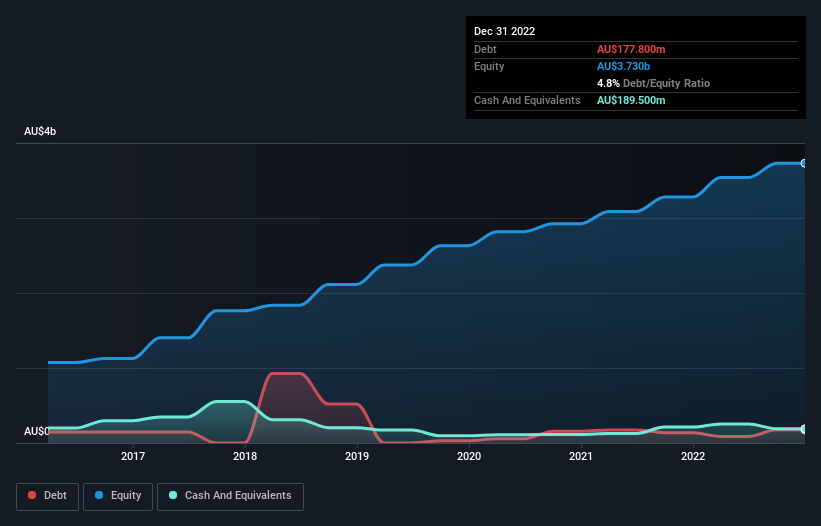The external fund manager backed by Berkshire Hathaway's Charlie Munger, Li Lu, makes no bones about it when he says 'The biggest investment risk is not the volatility of prices, but whether you will suffer a permanent loss of capital.' So it might be obvious that you need to consider debt, when you think about how risky any given stock is, because too much debt can sink a company. As with many other companies Beach Energy Limited (ASX:BPT) makes use of debt. But is this debt a concern to shareholders?
When Is Debt A Problem?
Debt is a tool to help businesses grow, but if a business is incapable of paying off its lenders, then it exists at their mercy. In the worst case scenario, a company can go bankrupt if it cannot pay its creditors. While that is not too common, we often do see indebted companies permanently diluting shareholders because lenders force them to raise capital at a distressed price. Of course, the upside of debt is that it often represents cheap capital, especially when it replaces dilution in a company with the ability to reinvest at high rates of return. The first step when considering a company's debt levels is to consider its cash and debt together.
See our latest analysis for Beach Energy
What Is Beach Energy's Debt?
The image below, which you can click on for greater detail, shows that at December 2022 Beach Energy had debt of AU$177.8m, up from AU$136.8m in one year. But on the other hand it also has AU$189.5m in cash, leading to a AU$11.7m net cash position.

A Look At Beach Energy's Liabilities
The latest balance sheet data shows that Beach Energy had liabilities of AU$489.5m due within a year, and liabilities of AU$1.20b falling due after that. Offsetting this, it had AU$189.5m in cash and AU$265.3m in receivables that were due within 12 months. So its liabilities total AU$1.23b more than the combination of its cash and short-term receivables.
While this might seem like a lot, it is not so bad since Beach Energy has a market capitalization of AU$3.20b, and so it could probably strengthen its balance sheet by raising capital if it needed to. However, it is still worthwhile taking a close look at its ability to pay off debt. Despite its noteworthy liabilities, Beach Energy boasts net cash, so it's fair to say it does not have a heavy debt load!
On top of that, Beach Energy grew its EBIT by 30% over the last twelve months, and that growth will make it easier to handle its debt. The balance sheet is clearly the area to focus on when you are analysing debt. But it is future earnings, more than anything, that will determine Beach Energy's ability to maintain a healthy balance sheet going forward. So if you want to see what the professionals think, you might find this free report on analyst profit forecasts to be interesting.
Finally, a business needs free cash flow to pay off debt; accounting profits just don't cut it. While Beach Energy has net cash on its balance sheet, it's still worth taking a look at its ability to convert earnings before interest and tax (EBIT) to free cash flow, to help us understand how quickly it is building (or eroding) that cash balance. In the last three years, Beach Energy created free cash flow amounting to 19% of its EBIT, an uninspiring performance. For us, cash conversion that low sparks a little paranoia about is ability to extinguish debt.
Summing Up
Although Beach Energy's balance sheet isn't particularly strong, due to the total liabilities, it is clearly positive to see that it has net cash of AU$11.7m. And it impressed us with its EBIT growth of 30% over the last year. So we are not troubled with Beach Energy's debt use. The balance sheet is clearly the area to focus on when you are analysing debt. But ultimately, every company can contain risks that exist outside of the balance sheet. Case in point: We've spotted 1 warning sign for Beach Energy you should be aware of.
At the end of the day, it's often better to focus on companies that are free from net debt. You can access our special list of such companies (all with a track record of profit growth). It's free.
Valuation is complex, but we're here to simplify it.
Discover if Beach Energy might be undervalued or overvalued with our detailed analysis, featuring fair value estimates, potential risks, dividends, insider trades, and its financial condition.
Access Free AnalysisHave feedback on this article? Concerned about the content? Get in touch with us directly. Alternatively, email editorial-team (at) simplywallst.com.
This article by Simply Wall St is general in nature. We provide commentary based on historical data and analyst forecasts only using an unbiased methodology and our articles are not intended to be financial advice. It does not constitute a recommendation to buy or sell any stock, and does not take account of your objectives, or your financial situation. We aim to bring you long-term focused analysis driven by fundamental data. Note that our analysis may not factor in the latest price-sensitive company announcements or qualitative material. Simply Wall St has no position in any stocks mentioned.
About ASX:BPT
Beach Energy
Operates as an oil and gas exploration and production company.
Undervalued average dividend payer.
Similar Companies
Market Insights
Community Narratives




